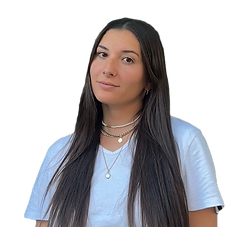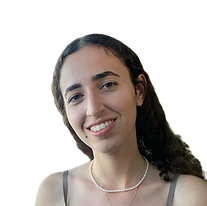PAPO LAB
_edited.jpg)
PROF. NIV PAPO
Prof. Papo develops high affinity proteins, using a combination of experimental and computational methodologies, to bind to and antagonize a variety of disease-related targets. He engineers novel proteins through both random and rational approaches to improve their selectivity such that they more specifically target receptors that are overexpressed in disease states but expressed at normal levels in healthy cells.
In doing so, his lab generates novel biotherapeutics and enhanced imaging agents.

TAMI MATUS
Research Administrative Support
STUDENTS

SHIRAN LACHAM
Lab manager

SIGAL GELKOP
Scientific Researcher
Sigal is developing and characterizing several nanobodies (NBs) that have tight and specific binding and internalization into cancer cells, and that accumulate specifically in these cells. She then conjugates the most potent NBs to a fluorescent dye and show that the conjugate targets and internalizes specifically into the cancer cells. Sigal's studies will be followed by animal models.

DOR GOZLAN
PhD student
Dor develops an approach to comprehensively measure the binding-specificity landscapes of human proteases and accurately predict target affinities and specificities of proteins with multiple mutations by combining NGS analysis of affinity screens and machine-learning-based models. This approach involves the most advanced machine-learning techniques to predict the specificity and affinity of protein variants based on their amino-acid sequences, physicochemical properties, and structural features.

DAN PASTERNAK
PhD Student
Dan's project is examination in different aspects of the multi-specific inhibitor C9-PEX, which binds CD44 and MMP-9 targets simultaneously on osteoclasts, as a potential therapeutic

NOAM TZURI
PhD Student
In her studies, Noam is developing dual VEGF/PDL1 inhibitors based on high-affinity scFv heterodimers as a therapeutic strategy. Specifically, this kind of a structure that consists of two scFv targeting VEGF and PDL1, followed by Fc is developed by Noam as a novel strategy for cancer therapy.

AMIT EISENBERG
PhD Student
in collaboration with Tomer Cooks, BGU
Amit research is about creating a combination modality for prostate cancer treatment. Previous experiments have shown that DaRT (radiation therapy) is not beneficial enough to fully cure the primary tumor and metastasis. For that reason, we are combining the DaRT with a nanobody-small molecule conjugate for the superior treatment of prostate cancer.

GAL ALON
PhD Student
Gal hypothesize that by conjugating between gold nanoparticles and a nanobody (NB), we could identify in an unambiguous way the nature of the binding of the NB to the native PSMA expressed on cancer cells. The gold nanoparticles will enable an easier identification of the NB-PSMA binding on the membrane of prostate cancer (PCa) cells in Cryo-EM, since they willlabel the PSMA protein and distinguish it from other membrane proteins.

REUT MOSHE
PhD Student
in collaboration with Yaron Orenstein, BIU
Reut maps binding specificity landscapes of human Kunitz domains toward engineering isoform-selective trypsin inhibitors. In a different project, Reut generates aggregation landscapes of Aβ42 toward engineering Aβ42 aggregation inhibitors. Reut is also identifying affinity enhancing mutations in an inhibitor-protease complex using mutant library screening and next generation sequencing. Reut accomplishes these tasks by integrating yeast surface display (YSD) combinatorial library screening with next-generation sequencing (NGS) and machine-learning (ML) approaches.

SHANI OHAYON
MSc student
Shani is developing a new strategy to fully block a process related to bone formation and resorption by engineering a multi-specific inhibitor that simultaneously targets CD44 and both the catalytic and hemopexin (PEX) domains of metalloproteinase-9 (C9). Shani is conjugating C9 via a flexible linker to PEX, thereby creating a multi-specific inhibitor (C9-PEX) that simultaneously targets CD44 and the catalytic and PEX domains of MMP9. Shani intend to follow C9-PEX ability to co-localize with CD44, inhibit MMP9 catalytic activity, reduce MMP9 cellular levels, interfer with MMP9 homodimerization, and reduce the activation of downstream MAPK/ERK pathway signaling. Importantly, the developed platform can be extended to other pathogenic MMPs as well as to other important target proteins and thus holds great promise for creating novel multi-specific therapeutics for bone and other diseases. Overall, the significance of the study lies both in the insight it provides into the MMP9-CD44 functional axis and in the potential applicability of the potent multi-specific inhibitor, as a new platform that can be extended to other important target proteins.

SAPIR HORENSTEIN
MSc student
In collaboration with Professor Yoram Etzion and Smadar Cohen groups at BGU, Sapir is developing a controlled release system based on drug-alginate sulfate (AIgS) particles for application in myocardial infarction (MI). Specifically, Sapir is focusing on (i) Characterization of drug–AlgS, i.e., he association and dissociation of the drug and the AIgS delivery system, (ii) Defining the mechanism leading to beneficial effects of the drug–AlgS against post-MI remodeling, including in vivo studies, and (iii) Scaling up production of the drug and the particles.

INBAR BAHAT
MSc Student (Meitar program)
We postulate that the KLK6-MMP9 network plays a key role in the development and progression of cancer. The overall goal of Inbar's research is to develop a new class of dual-specific KLK6/MMP9 inhibitors. These inhibitors are synthesized by linking a small molecule KLK6 inhibitor (generate in the lab of Dr. Aubry Miller from DKFZ, Germany) to an evolved MMP9 inhibitor that is derived from a N-TIMP2, creating chimeric molecules that could open the door to a new class of cancer therapeutics.

OFIR PALOMO
MSc Student (Meitar program)
For the Nanobodies (Nbs) to be able to deliver and allow trapping of radioactive compounds into HER2+ breast cancer cells — a prerequisite for efficient targeted therapy and diagnostics — they must bind and be internalized specifically into HER2+ cells. To test the internalization capability of the Nbs, Ofir shall label them fluorescently and incubate them with either live BT474, SKBR3 and MDA-MB-452 (HER2+) and HER2-silenced breast cancer cells. Confocal imaging of the cells will reveal if the Nbs colocalize with HER2 and whether the Nbs appear on the cell membrane, in clusters inside the cells, or both. This will allow Ofir to follow the fate of the Nbs and their HER2 target upon interaction of the former with cancer cells and thus develop potent Nb based carriers for radioisotopes (for imaging and therapy) and cytotoxic drugs.
.

MICHAL LEVI
MSc Student (Meitar program)
Michal maps binding specificity landscapes of human Kunitz domains toward engineering isoform-selective trypsin inhibitors. Protease interactions with endogenous protein protease inhibitors serve as archetypal models for molecular recognition in protein-protein complexes. We have recently made breakthroughs in quantitative prediction of the impact of single and double mutations in several such systems, by integrating functional screening of combinatorial yeast surface display (YSD) libraries with next-generation sequencing (NGS), in silico analyses, and experimental calibration. In her project, Michal will extend this methodology to human Kunitz domains, which offer templates for engineering selective trypsin inhibitors, and map their protein-protein interaction (PPI) landscapes with unprecedented precision.

FERAS JABAREEN
MSc Student
Feras studies the compatibility of Aβ42DM, previously developed in the lab as an Aβ42 aggregation inhibitor, with buffers that would be usable in mouse model of Alzheimer's disease (5XFAD). By attaching osmotic pumps with a sustained release system to the mouse brain, we plan to study the effectiveness of Aβ42DM in preventing Aβ42 aggregation and toxicity in pre-clinical models of Alzheimer's disease.

MAYA RABINOVICH
MSc Student (Meitar program)
In this study, Maya designs an Aβ42-interacting cyclic peptides that are based on the β-hairpin amino acid sequence of Kuniz family proteins, which exhibit high similarity to the β-sheet-like aggregation site of Aβ42 amyloid. Specifically, Maya elucidates whether the interaction of the cyclic peptides with Aβ42 enhance or reduce the formation of high-molecular-weight Aβ42 aggregates. She determines whether the cyclic peptide interferes with the interactions of Aβ42 with both artificial membrane phospholipids and intact plasma and mitochondria membranes. Later on, Maya will test the effects that the the cyclic peptides exhibit on Aβ42-mediated mitochondrial membrane depolarization, cellular apoptosis and death of neuronal cells. All in all, Maya elucidates the mode of action of the cyclic peptides and their evaluates their potential for further development as therapeutics for Alzheimer disease.

ITAMAR YIZHAK
MSc Student (Meitar program)

TAHEL LOTEM
MSc Student (Meitar program)

AMIT ASHER
MSc Student (Meitar program)

NIV LORBER
MSc Student (Meitar program)

SHIRA BEN ZUR
MSc Student (Meitar program)

SIVAN YACOV
MSc Student
in collaboration with Assaf Yaakobovitz, BGU
FORMER STUDENTS

YIHEA LAFI
MSc Student 2024
MSc Thesis:
today:
open to hiring
_edited.png)
YANIV DEBUTTON
MSc Student 2024
MSc Thesis: Utilizing non-canonical amino acid for site-specific conjugation of small molecular agents to nanobody
today:
Process development scientist at Celleste Bio
_edited.png)
STEFAN LLIC
Post Doctoral Fellow 2025
Stefan is targeting novel protease PRSS23 to inhibit ovarian cancer progression and define the enzymatic activity and determine the structure of PRSS23. In a different project, Stefan is developing high affinity peptide binders to subunit 3 (apical domain) of the yeast chaperonin CCT/TRiC, which has 8 different subunits that most likely have different substrate specificities, but they are not known.
today:
open to hiring

OZ REUVENI
MSc Student 2023
MSc Thesis: Developing a method for predicting binding selectivity of proteins with two mutations to similar structural targets
today:
Scientist at Alagene

YUVAL PINKERT
MSc Student 2023
MSc Thesis: Inhibiting multiple targets with a protein using non canonical amino acid of site-specific labeling
today:
R&D scientist at NewMoo

SHIR EDEN
MSc Student 2023
MSc Thesis: the fate of an ANTI-HER2 nanobody: mode of action studies in cancer cells
today:
Business Development Manager at Steakholder Foods

GILI SHAPIRA
MSc Student 2023
MSc Thesis: Generating N-TIMP2 with multiple mutations for enhanced specificity to MMP9
today:
application specialist at phenome networks

SVETLANA KATCHKOVSKY
Post Doctoral Fellow 2023
PhD Thesis: "Engineering a Competitive Inhibitor for Sclerostin to Promote Wnt Signaling and Bone Anabolic Functions"
Today:
open to hiring

AMIT ITZHAR
MSc Student 2022
MSc Thesis : "Development of a potent sustained-release MMP-9 inhibitory system agains left ventricular remodeling post-myocardial infarction."
Today:
Scientist at Emendo

ZIV AZOULAY
Post Doctoral Fellow 2022
Conjugating a small molecule agent to an anti HER2 nanobody for therapy of breast cancer.
Today:
Scientific researcher at NanoGhost

AMIRAM SANANES
PhD Student 2021
PhD Thesis: "A potent, proteolysis-resistant inhibitor of kallikrein-related peptidase 6 (KLK6) for cancer therapy, developed by combinatorial engineering"
Today:
Scientific analyst at Medison Ventures

MAY MELTZER
PhD Student 2021
PhD Thesis: "Directed evolution to engineer improved proteins for structural studies and drug discovery"
Today:
Scientific IP lead at Prilenia

HEZI HAYUN
PhD Student 2021
PhD Thesis: "Bioorthogonal chemistry for improving the pharmacokinetic properties and inhibitory activity of N-TIMP2"
Today:
Scientist at Aleph Farms

LIOR ROSENFELD
PhD Student 2020
PhD Thesis: Using combinatorial methods to study protein-protein interactions and generate new ones for developing protein-based therapies and diagnostics.
Today:
Molecular Biologist at Ukko

SHAY-LEE AHARONI LOTATI
MSc Student 2020
MSc Thesis: "Identifying affinity enhancing mutations in an inhibitor-protease complex using mutant library screening and next generation sequencing"
Today:
PhD student at Weizmann Institute of Science

HAGIT BACHMAT
PhD Student 2021
PhD Thesis : "Computational prediction of protein protein interactions (PPI) by combining NGS, energy terms and machine learning."
Today:
PhD student in computer science at BGU university .

GAL YOSEF
PhD Student 2020
PhD Thesis: "Engineering bi-specific inhibitors for matrix metalloproteinasas"
Today:
Scientist at JAMM therapeutics

Oshrit Shalev PhD
Previous Lab Manger
Today:
Scientific researcher at Opko

LITAL BEN NAIM
PhD Student 2020
PhD Thesis: Developing proteins and nanobodies as conformation-specific inhibitors.
Today:
Postdoc fellow at the department of Radiology at Harvard Medical School and Massachusetts General Hospital

SEGEV NAVE
MSc Student 2020
Master Thesis: "A Mechanism for the Inhibition of Tau Neurotoxicity: Studies with Artificial Membranes, Isolated Mitochondria, and Intact Cells."
Today:
PhD student at Weizmann Institute of Science

OFEK OREN
PhD Student 2020
PhD Thesis : "Protein engineering in mammalian cells- developing novel inhibitors for amyloids aggregation"
Today:
Researcher at Aleph farms

MAAYAN EILON ASHKENAZY
MSc Student 2019
MSc Thesis : "Designing a sustained-release system for myocardial infarction treatment."
Today:
PhD student at Weizmann Institute of Science

EITAN RABINOVICH
PhD Student 2019
PhD Thesis: "Using in vitro evolution approaches for the mapping of SCF binding epitopes and the design of novel binders and inhibitors for PAR1"
Today:
Molecular Biologist at at Ukko

NOAM ELIASH
MSc Student 2019
MSc Thesis: "Engineering high affinity binders for orphan receptors:
a nanobody-Tie1 complex as a case study."
Today:
Research And Development Engineer at Aummune

YUVAL ZUR
PhD Student 2019
PhD Thesis: "Developing bi-specific M-CSF-based antagonists against c-fms and αVβ3 integrin."
Today:
Molecular Biology Scientist at Cytonus Therapeutics Inc. USA

VALERIA ARKADASH
PhD Student 2018
PhD Thesis: "Developing an inhibitor for Matrix Metalloprotease (MMP)-14 and MMP-9 based on the N- terminal domain of the natural inhibitor TIMP2, for cancer treatment"
Today:
Research associate in the department of Structural Biology at the Weizmann Institute of Science.

VICTOR BANERJEE
Post Doctoral Fellow 2018
Design of Amyloid inhibitors by directed evolution: Target Multiple Amyloidogenic Proteinsץ
Today:
Works as a postdoctoral researcher at Prof. Claudio Soto's lab department of Neurology, McGovern Medical School UT health.

LIDAN AHARON
MSc Student 2018
MSc Thesis : "Quantitative mapping of binding specificity landscapes for homologous targets by using a high-throughput method"
Today:
Java Developer & Scrum Master at the bank's revolutionary modernization project

YUVAL HOREV
MSc Student 2018
Mater thesis: "Developing protein bispecific heterodimers to antagonize MT1-MMP and MMP2 for cancer therapy."
Today:
PhD student at the Technion – Israel Institute of Technology

ITAY COHEN
PhD Student 2018
PhD Thesis: "Combinatorial engineering of proteolytically resistant APPI variants that inhibit human mesotrypsin for cancer therapy."
Today:
Works at TEVA

BAR DAGAN
MSc Student 2018
Master Thesis: "Design of SOD1 Amyloid inhibitors by combinatorial methods"

MICHAEL HEYNE
PhD Student 2018
PhD Thesis: "Utilizing computational and experimental approaches to study APPI-Mesotrypsin and BPTI-trypsin binding interactions in residue-level resolution"
Today:
Works as International Application Specialist at Hamilton Bonaduz AG

TOMER SHLAMKOVITCH
PhD Student 2018
PhD Thesis : "Developing new generation of angiopoietin-2 derived Tie2 antagonists for cancer imaging and therapy."
Today:
Director of Antibody Engineering at Biolojic Design, Ltd.

MSc Student 2017
SI NAFTALY
MSc Thesis: "Mapping protein specificity landscapes using a combination of multi-target selective screening and next-generation sequencing of combinatorial libraries"
Today:
Molecular biologist at Ukko

DANA KOSLAWSKY
MSc Student 2017
Master Thesis: "A bi-specific inhibitor targeting IL-17A and MMP-9 reduces invasion and motility in MDA-MB-231 cells".
Today:
Data Scientist at Anodot

TAL TILAYOV
MSc student 2016
Master thesis: "Engineering antagonistic Cytokine Stem Cell Factor variants to provide a new therapeutic mechanism for cancer."

ORNA AVIDAN
Post Doctoral Fellow 2015
Targeting ErbB1/2 with Tendamistat for applications in cancer imaging and therapy.
Today:
Retired

TAL HINGALY
MSc student 2014
Master thesis: "Engineering antagonistic Cytokine Stem Cell Factor variants to provide a new therapeutic mechanism for cancer"
Today:
Works at TEVA

GALIT SHAHAF
Post Doctoral Fellow 2014
"Developing cyclotide-small molecule conjugates to antagonize MT1-MMP for cancer therapy"

TAMARA BIRMAN
MSc Student 2014
Master Thesis : "Using directed evolution to engineer Tendamistat variants with high affinity to PSMA for Prostate cancer diagnostics."
Today:
PhD student at the Technion – Israel Institute of Technology
Project students:
2012 – 2013 - Helly Atia, Hagar Gallea, Eitan Rabinovitch
2013 – 2014 - Gal Yosef, Shani Butbika, Anat Afek, Karin Cohen, Lior Rosenfeld
2014 – 2015 - Dana Koslowsky and Tal Tilayov
2015 – 2016 - Hagit Bachmat, Nofar Dalal, Bar Gazit
2023-2024 - Bar dery and Dekel azulay
High school students
2016 – 2017 – Naama Shafir
2018 – 2019 – Roni Gliksman
2020 – current – Evyatar Azulay